Vegetable gardeners need surprisingly few tools. This is especially true if you’re growing in raised beds or containers, which are perfectly designed for working with gloved hands. However, there are times when tools can be really handy.
If you’re a new gardener, start with just a few essential tools. Add to your collection slowly as you learn your needs and gardening style. Start with midpriced tools that are strong and sturdy. Over time, you might want to add high-quality versions of your favorites, like a hand-forged trowel.
Keep the size of your garden in mind when choosing tools. Balcony gardeners will do fine with just a trowel and a couple of hand tools, while backyard gardeners may benefit from a range of full-size tools. If you have friendly neighbors, consider sharing big and infrequently used tools, like wheelbarrows. Bonus points if you can find versions with brightly colored handles, as gardeners are notorious for misplacing tools while they work.
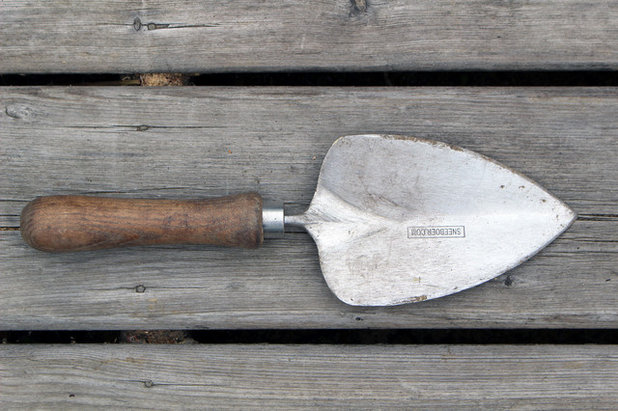
Abundant City
1. Trowel. When it’s time to plant tomato seedlings or move a chive plant to a new location, a good trowel is your best friend. Use this multipurpose tool to help with transplanting, weeding, removing stones and dividing herbs that are spreading without damaging the roots of nearby veggies.
Look for a trowel with a comfortable handle and sturdy, sharp sides that can cut into the soil. Trowel blades come in different widths, from narrow “transplanters” (ideal for planting seedlings) to broader options. If the budget allows, get one transplanter and one broad trowel, as you’ll find both useful.
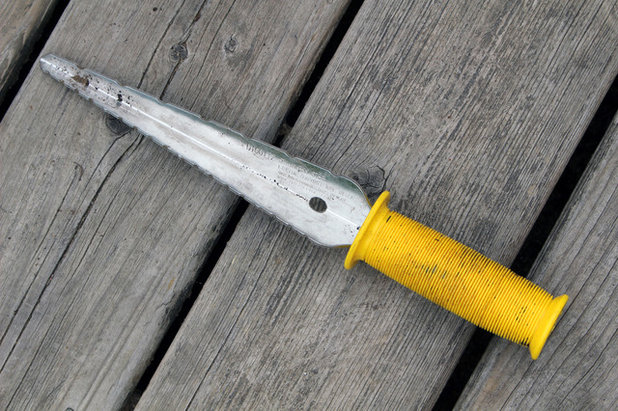
Abundant City
2. Weeder. Sometimes a trowel isn’t enough to remove pesky weeds, so consider a specialized weeding tool. Several types are available, and your preference will depend on the types of weeds you deal with. The tool pictured here is a lifesaver for removing dandelions and other deep-rooted weeds from delicate raised beds and narrow spaces.
See natural ways to get rid of weeds in your edible garden
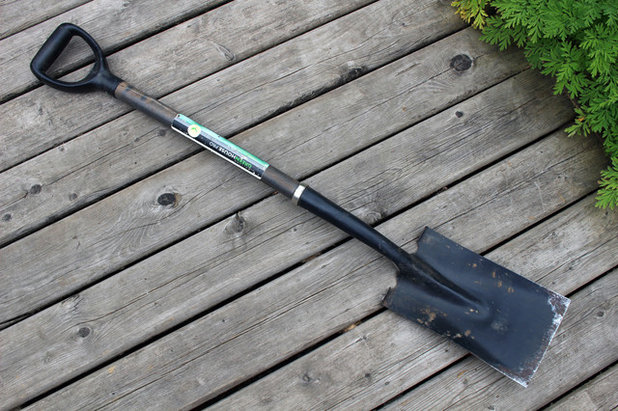
Abundant City
3. Shovel. When it comes to adding soil or compost to beds, digging manure under or hilling up potatoes, a good shovel is essential. Several types are available, including ones with a round point or square point, and a long handle or short handle. Try several types until you find the one you’re most comfortable with.
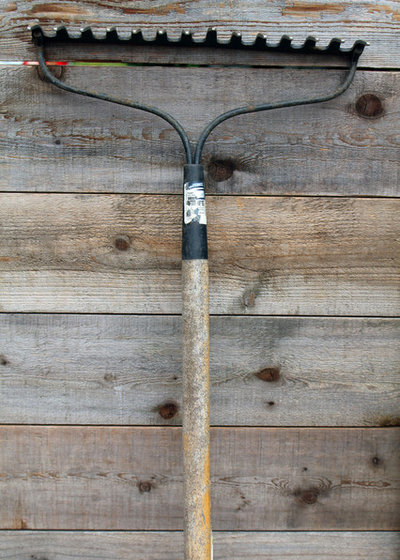
Abundant City
4. Hard rake. A hard rake is useful for a variety of tasks, from incorporating compost to smoothing out raised beds. Be sure to practice rake safety: Never leave your rake lying down with the tines facing up. Aside from being a cartoon joke, stepping on a rake can cause serious injury. Lean your rake against a fence or lay it down with the tines facing down.
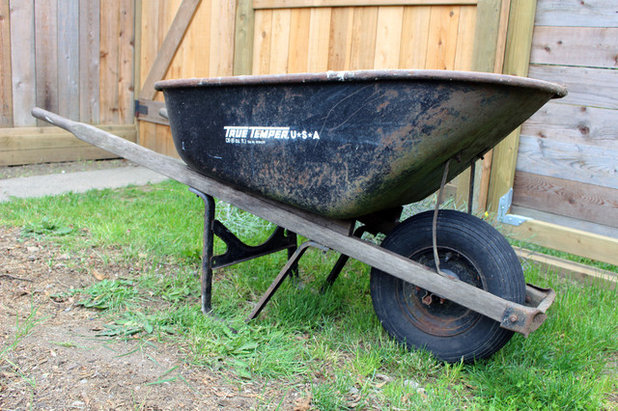
Abundant City
5. Wheelbarrow. If you’re working in a full-size garden, a wheelbarrow can be very helpful. While you may not use it every day, it’s a lifesaver when it comes to moving soil and distributing compost. Look for a wheelbarrow with sturdy wheels, and that’s narrow enough to fit between your garden beds.
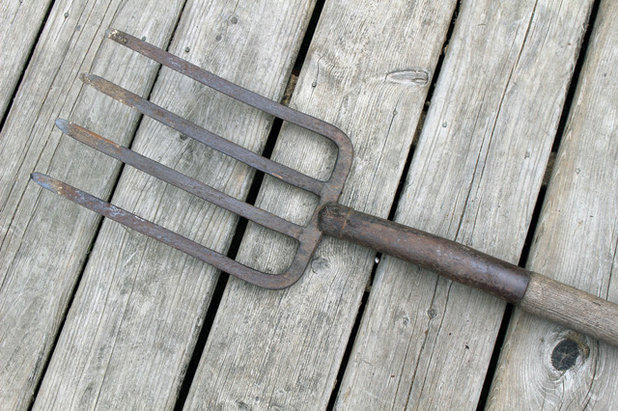
Abundant City
6. Digging fork. When it comes to aerating compost or spreading mulch, a digging fork — a type of pitchfork with wide, sharp blades — can come in really handy.
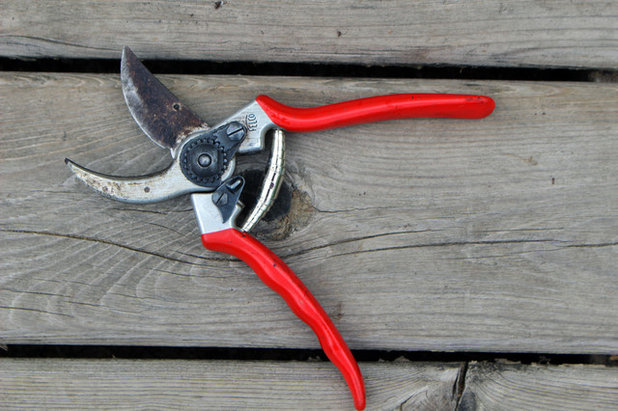
Abundant City
7. Handheld pruners. Although you’ll have little use for pruners in vegetable beds, they’re essential for pruning fruit trees and can be very useful when you need to clip back nearby shrubs that encroach on your raised beds. Use them to keep spreading raspberry canes in check too. Find a sharp, strong pair that feels comfortable in your hands.
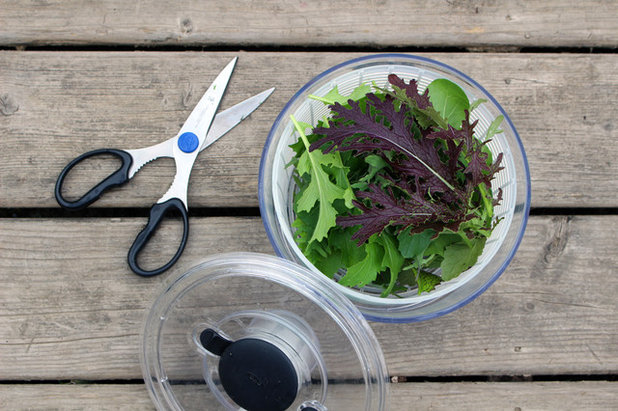
Abundant City
8. Kitchen scissors and salad spinner. Of all the tools a vegetable gardener can have, a sturdy pair of kitchen scissors is perhaps the most useful. Use the scissors to harvest your crops. For perfect garden flow, pop your harvested veggies right into a salad spinner for easy washing. You’ll likely find yourself using these kitchen tools more often than anything that’s actually designed for gardening.
Maintaining tools. Get the most out of your tools by maintaining them well. Remove soil with a wire brush, soaking off any caked-on mud first. Use a rag to apply vegetable oil to all the metal and wood tool parts (avoid using motor oil, popular with some gardeners, on tools used for vegetable beds). This regular upkeep will prevent rust and keep your tools in good shape for years. It’s also very worthwhile to learn how to sharpen your tools. Store your tools in a garage or shed to keep them away from rain, snow and mud, which can cause rust.
Your turn: What’s your favorite garden tool? Do you have an unusual use for a gardening tool? Tell us about it in the Comments.





